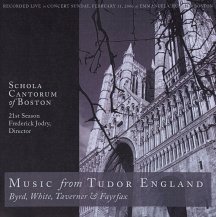








Byrd, White, Taverner & Fayrfax
Recorded Sunday February 11, 2006
To purchase this CD, recorded live in concert,
please send a check for $18
made out to Schola Cantorum of Boston:
Frederick Jodry
209-A Williams Street
Providence RI 02906
Schola Cantorum
Frederick Jodry, Director
Soprano: Diana Brewer, Lydia Brotherton, Teresa Wakim
Alto: Miranda Loud, Mary Gerbi
Tenor: Bradley Naylor*, Arthur Rawding, Steven Soph*
Bass: Adam Green,Jacob A. Cooper, Frederick Jodry*, Erik Sumner'
(*also Alto)
1. Exsurge Domine William Byrd (1543-1623)
2. Visita quaesumus
3. Lamentations, Part I Robert White (c. 1530-1584)
4. Be unto me, O Lord Byrd
5. Sing joyfully
LAUDIBUS IN SANCTIS Byrd
6. I. Laudibus in sanetis
7. II. Magnijieum Domini
8. III. Hune arguta
9. Lamentations, Part II White
10. Qyemadmodum desiderat cervus John Taverner (c. 1490-1545)
11. Magnificat "O bone Jesu" Robert Fayrfax (1464-1521)
In today's concert, we explore the riches of the English Renaissance, both before and after the Reformation. The earliest piece, the Fayrfax Magnificat, is contained in the Eton Choirbook, one of the few collections of vocal music to survive the Protestant purges of the 1530ís. In an effort to simplify the rites of the Anglican Church, organs, statuary, vestments and books of choir music were destroyed, being seen as distracting to worship, and too symbolic of Roman Catholic practice. Such elaborate musical settings as were found in the Eton Choirbook, verses alternating between plainchant and sumptuous and elaborate polyphony were newly forbidden. I find the long-winded melismas, the endlessly varied contrasts of vocal scoring and texture deliciously Medieval, with its constant delight in ornament.
John Taverner's life also spans both sides of the Reformation, but he wrote all his music for the Catholic service, and was briefly jailed in 1528 for hiring singers who were Protestant sympathizers. He lived his life outside of court, working at Cardinal College Oxford (today Christ Church Cathedral), and at St.
Botoph's Church, Boston. His works include several cantus firmus and parody masses (rather like his continental comrade Josquin), and large scale votive antiphons.
Quemadmodum survives only in an untexted score, but the words to Psalm 42 (usually given as sicut cervus) can be fitted without undue trouble.
Robert White is probably the composer least known today on this program, but was highly thought of in his day. He followed his father-in-law Christopher Tye at Ely Cathedral, and served as choirmaster at Westminster Abbey in the 1570's. It is interesting to note that at this period Elizabeth allowed avowed Catholics to serve at Westminster Abbey, St. Paul's (Westcott) and the Chapel Royal (Farrant). A contemporary of Lassus and Palestrina, White's music is quite inventive, particularly in its often elaborate scoring and wide vocal ranges. Two sets of Lamentations survive by White, in 5 and 6 parts; here we sing the five voice setting. The writing is restrained, reflecting the somber nature of the texts of the prophet Jeremiah, lamenting the downfall of Jerusalem. White follows the convention of setting the Hebrew letters that divide the text in poetically flowering music, rather like an illuminated capital letter at the outset of each verse.
William Byrd was not only a great composer, but must have been a great diplomat. He worked in all forms of the Renaissance, writing sacred and secular vocal music, as well as superb keyboard and consort music. He served in Elizabeth's (Protestant) Chapel Royal alongside Thomas Tallis, while publishing Latin motets, graduals and Masses, and eventually leaving London to more fully celebrate his own Catholic faith. Unlike Peter Philips and Richard Dering, who fled England for religious reasons, Byrd adroitly maintained a position at court even as his family was fined for refusing to attend Anglican services. His motet texts often seem pointed in their references to the persecution of English Catholics (Exsurge a prime example), comparing the plight of the English Catholics to the captivity of the Jews in Egypt. His music certainly shows a lively imagination, and when required to set English texts, Byrd does so with a verve and wit and joy unmatched by any other Elizabethan composer.
-LFJV
Locations Past Seasons Reviews Contact Us